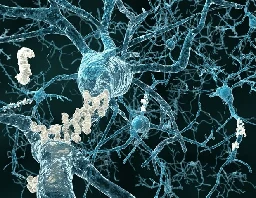
Neurodegenative Disease Support
- ALS and mislocated proteinswww.news-medical.net Hundreds of proteins and mRNA molecules mislocated in ALS nerve cells
Researchers at the Francis Crick Institute and UCL have shown that hundreds of proteins and mRNA molecules are found in the wrong place in nerve cells affected by Motor Neuron Disease (MND), also known as Amyotrophic Lateral Sclerosis (ALS).

"Researchers at the Francis Crick Institute and UCL have shown that hundreds of proteins and mRNA molecules are found in the wrong place in nerve cells affected by Motor Neuron Disease (MND), also known as Amyotrophic Lateral Sclerosis (ALS).…
[N]ew research published today in Neuron shows that the problem is much broader. This 'mislocalization' affects many more proteins than first thought, especially those involved in RNA binding. The mislocalization extends to mRNAs too, molecules that deliver instructions to make proteins from the DNA in the nucleus."
- Alzheimer's news roundup: new tests, vaccine
New tools for early detection and prevention in progress.
Blood test: https://www.reuters.com/business/healthcare-pharmaceuticals/quest-diagnostics-launches-alzheimers-blood-test-consumers-2023-07-31/
Vaccine: https://neurosciencenews.com/vaccine-alzheimers-23722/
Gut microbiome: https://www.nia.nih.gov/news/changes-human-microbiome-precede-alzheimers-cognitive-declines
Protein markers in genetically-transmitted Alzheimer’s: https://www.alzforum.org/news/research-news/proteomics-discerns-sporadic-familial-alzheimers-disease
- Namenda/Memantine price-fixing, class action suitwww.openclassactions.com $56M Alzheimer's Medication Price-Fixing Monopolization Class Action Settlement - No Proof is Required
File a claim to participate in the No Proof Required $56 Million Alzheimer's Namenda and Memantine Price-Fixing Class Action Lawsuit

Dementia / Alzheimer's Medication Class Action
"A $56 Million Class Action Settlement has been settled with pharmaceutical companies that manufacture and market certain Alzheimer's disease medications. The class action lawsuit alleged that pharma companies including Actavis, Merz, Teva, Dr. Reddy's, and Wockhardt conspired intentionally to keep generic versions of Alzheimer's medication off the shelves in order to drive up the cost of Namenda Alzheimer's medication. In the United States, the generic version of Namenda Alzheimer's disease drug is also known as Memantine."
Page contains a link to join the class action suit.
- Working Towards Earlier Diagnosis of Multiple Sclerosiswww.news-medical.net Working Towards Earlier Diagnosis of Multiple Sclerosis
Getting an early diagnosis for multiple sclerosis (MS) is important in ensuring better long-term outcomes and quality of life.

I feel like this is a common problem in neuro diseases. If only we could get an earlier diagnosis, we would have fewer people seriously disabled by these diseases at a young age, while they visit their doctors over and over begging for some sort of help.
- Why the Next Big Hope for Alzheimer’s Might Not Help Most Black Patientskffhealthnews.org Why the Next Big Hope for Alzheimer’s Might Not Help Most Black Patients
Black patients and other minorities tend to be diagnosed at later stages of the disease, which would exclude them from use of Leqembi. Few Black people were included in the main trial of the drug.

Racial disparities in drug trials, and disparities in overall medical care, among other factors, make the recently-approved Alzheimer's break-through drug lecanemab less likely to benefit African Americans.
- Another resource on dementia: Being Patientwww.beingpatient.com Home
Covering the latest Alzheimer’s disease and dementia news through journalism, patient perspectives, and exclusive interviews with leading experts.
From their "about us" page: "'Being Patient' is an editorially independent news and community platform that aims to create clarity around complex health issues and be a trusted, accurate source of information for the people impacted by a disease."
Some good, apparently well-vetted info on Alzheimer's and related dementias. Emphasis on personal narratives from people with dementia, and from caregivers.
- New York Times article on inheritable dementiawww.nytimes.com The Vanishing Family
They all have a 50-50 chance of inheriting a cruel genetic mutation — which means disappearing into dementia in middle age. This is the story of what it’s like to live with those odds.

"The Vanishing Family." This is a "gift" link, so you shouldn't hit a paywall; let me know if you have any problems.
- New test for Alzheimer'swww.news-medical.net Finger prick blood sample can detect Alzheimer's biomarkers
Advancements in technology and practice reported for the first time at AAIC 2023 demonstrate the simplicity, transportability and diagnostic value of blood-based biomarkers for Alzheimer's, including the future potential for at-home testing by a patient or a family member.

- How to vet a “skilled nursing home” with online information
So my partner with Alzheimer’s is in a skilled nursing facility. She wouldn’t walk or exercise for several years; fell repeatedly; and after a stint in the ER, flunked out of rehab. She’s now in long-term care on Medicaid, in a place which I will call Roach Motel because (you know) “roaches check in, but they don’t check out.” They want her money. I am physically unable to care for her at home 24/7.
I don’t know that I could have gotten her into a better place than Roach Motel from a hospital ER. The ER was adamant: “we need to kick her out NOW, because she’s taking up space and we can’t do anything more for her. You have two choices, and they’re both wretched. Roach Motel is slightly less wretched.”
I didn’t know much about Roach Motel, but I document here how I was able to find the skeletons in their closet, in hopes someone with more time to consider can avoid voluntarily selecting a toxic waste dump for their loved one. Presumably, this roadmap will work for assisted living, memory care, and other types of care facilities too. This strategy works for the US; I believe it should be transferrable to other countries.
Yes, ideally you should visit, do the sniff test (does eau-d’-urine waft through the halls?), ask questions (do you treat patients with respect?), sample the food (it’s all institutional, but is there some semblance of palatable, recognizable food items?) However, good places will be honest, and garbage dumps will show-and-tell you what they want you to see. They will appear similar. How to tell the difference?
You can coax a lot out of online searches.
First, start with the facility’s full proper name; add city and state if necessary. Search online. You can use Google’s search engine for this first part—but for later searches, I suggest something like DuckDuckGo. Reason: some search engines accept pay to promote good reviews, suppress bad ones. It’s called SEO, “search engine optimization.” You want to see what they will pay not to show you.
Your first search results will show you the puff pieces: the glossy-brochure language, promotional articles, glowing (likely paid) customer reviews.
Next, add the following to your search string: <Medicare Medicaid rating>. It doesn’t matter whether you have either in your healthcare portfolio. Both programs review and rate facilities based on complex metrics. Scroll through the resulting pages to see what the criteria mean, what they are based on. Pay some attention to consistency of ratings—if one month, they are at 5 stars (out of 5), the next month jump to 3, back up to 4, and a month later drop to 2, then they’ve got issues.
Next, use the facility name and add strings such as <complaints>, <lawyers> or <lawsuits>. The Yelp-style ratings system will always skew to extremes; they elicit comments from people who are either deliriously happy, or inconsolably angry. Take both with a grain of salt. Sometimes, a patient’s medical issues will overwhelm even the most meticulous of care, and that can leave loved ones looking to assign blame. But if you see a bunch of ambulance-chasers boasting of success “suing the pants off” of your facility, it’s not a good sign.
Next, using facility name, switch over from the “general” tab of your search engine to “news,” and sort by “most recent.” What does recognized journalistic reportage have to say about your facility? You may find reports of union strikes, egregious heath and safety violations. Or you may find the C-suite honcho or top manager bragging, prognosticating a bright future for happy patients with excellent care. Are the honcho’s comments realistic? Does it appear he or she thinks an increase in Medicare or Medicaid per-diem payments will fish them out of their current financial morass? (Ha! Dream on!) Read between the lines; why is this piece of reporting “news”? What is the honcho responding to? Bottom line, what pending financial instabilities do you see? (If they have problems looming, those problems won’t be reported; they’re speculation, not yet actual news. Make some intelligent guesses of your own.)
Finally, use the facility name and add <owners>, searching with the “general” tab. The dirty little secret of most nursing homes is that they are for-profit entities, and that they are owned by a handful of people who are very well-off, and who bring family and friends into the business with them. Whatever their values, they will likely be applied to (and visible in) other facilities in which owners have s share.
From what I’ve seen, there may be a dozen or so owners. Each one owns a percentage share of your target institution, and a percentage share of many other institutions across the country. They’ve got empires going. One I read about purchased a whole airline for his son to play at running—where did that money come from?
Pick a few names from the top of the list, and start online searching those names. (If names are common, you may have to toss in a few qualifiers like “nursing.”) The people at the top have the biggest percentages. Chances are, you’ll start seeing other names appearing on the sites you turn up—the other co-owner investors listed as owners.
What kinds of complaints, fines, lawsuits, violations, fraud, allegations or similar shenanigans do you see? The owners of your target facility almost certainly have shares in other facilities that have done bad enough things to become internet-searchable. If your target facility is not currently under the gun, that’s not necessarily good news. Chances are excellent they simply have not been caught and publicized yet. An owner of multiple facilities is not going to treat your target facility any differently than all the others they own.
And for 50 extra bonus points: set up a Google Alert.” Search online for <Google Alert>. Sign in to your Google account. In the dialog box “search for,” enter the full name of your target institution. My preferences from drop down menus (set to default unless otherwise indicated): how often—once a day; region—US; how many—all results. (If you get irrelevant info, you can modify these settings later).
- New Drugs on the horizon in 2023www.biospace.com Top 2023 Neurodegenerative Readouts | BioSpace
Clinical results for experimental treatments in Alzheimer’s, ALS and more are expected over the coming months. BioSpace highlights a few of the more highly anticipated datasets.

Who knows... maybe there is hope that some of us will suffer less than we expected to.
- Why we shouldn't federate with Farcebook: lying ads
I was on Farcebook earlier today, and caught not one, but two ads using the hashtag #dementiaawareness. (I was looking for something else.) I reported them to Farcebook as lies, and they disappeared, so sadly I can't share screenshots.
But basically, y'all know the drill: "Did you know you can cure dementia with this one simple thing?" I had to double-check—yup, it was "sponsored content." Someone paid to put it there.
Clicked through to a long rambling bunch of yadda yadda, coming from a Very Important MD with Very Big Credentials (you can read that in tRump's voice if you wish…), who has seen through the falsehoods of conventional therapies. Yes, all of the side-effects which the (white, male, pretty-boy) doctor lists for donepezil are truthful. Similar padding and truthful (but partial) information about other established medical interventions.
After pages and pages of half-truths, we get to the point: all you have to do to permanently reverse and cure dementia is buy our cannabis gummies! Here is a picture of Jane Doe with dementia, and here is a picture of Jane Doe after just one week taking our gummies! Wow!!!
- What I’ve found on Alz.orgwww.alz.org Home
Alzheimer's Association national site – information on Alzheimer's disease and dementia symptoms, diagnosis, stages, treatment, care and support resources.

Alz.org is the website for the US based Alzheimer’s Association. They focus primarily on Alzheimer’s, but also contain some material on other forms of dementia.
The site interface is designed to be easy to navigate for those who are not medical professionals, but digging through some of the menus will get you to refereed journal articles and other professional resources, as well as granular suggestions for caregivers seeking to offer dignified, appropriate levels of support for loved ones.
Of special interest: their phone hotline, available 24/7. From my experience, they seem to have a vast phone-tree of specialist consultants—so you can call in to vent, ask for tips and strategies, or to get pointed in the right direction for independent research.
I was especially impressed with their ability to get me connected to local resources—lists of adult daycare, nursing homes & memory care, checklists on how to evaluate offerings, and so on. So often, I’ve asked for help through insurance company reps, or doctors’ offices, or dug up stuff myself online—only to find it’s outdated or contains information that isn’t useful.
- Introduce yourself here if you haven't already done so!
It would be nice to get to know each other as we all wander in here.
- Any thoughts on getting this community rolling?
I tried posting on a Discord for people with/caregiving for those with dementia. Got a nibble of interest, got pinned by the mod, wrote out detailed instructions on how to get on Lemmy and find us… Possibly the geek level killed interest.
The Discord is pretty quiet, except for incoming bot posts, an IFTTT feed directly from r/dementia to the Discord. (It's one-way, we can see them on Discord, but they can't see us.) Is it worth posting in Reddit, do you think? I'm wondering if I even mention Lemmy, whether I'll get permabanned from Reddit.
- How has everyone been coping recently?
I've been checking for new posts here but not actively trying to create anything new the last week or so because I've been spending most of my available free time elsewhere on Lemmy and Beehaw trying to help prepare for the possible onslaught of new ex-Redditors expected yesterday and today.
As they (hopefully)make their way to Lemmy, I hope they find us and join our community, too.
Please feel free to chat about whatever it is you need help or support with, or post articles of interest to the community if you see them.
- What's going on in your world? I hope it's a good weekend.
I am resisting the urge to do too much after being down for over a week with a sinus infection/migraines. My husband was working a bunch of overtime the whole week, so had to extend his usual caregiver duties to keeping this whole ship afloat while barely being home enough to sleep and eat.
I'm formulating a plan to do the most important of the cleaning that got missed (planning is still one of my strengths so I happily contribute in that way) and I'll do a few things but I can't overdo it yet.
Hubby and I are also reading a book together so I am going to do that when I need a break.
- Practical solutions for caregiver stresswww.mayoclinic.org Practical solutions for caregiver stress
Fight caregiver stress and prevent burnout by taking time to take care of yourself.
I hope everyone is taking care of their physical and mental health today.
- My parter 62F has Alzheimer's
Thank you, ZenGrammy! I don't have the time or the tech chops, and was hoping someone would start a community like this. I'm a Reddit refugee who was active on r/Dementia, r/Alzheimers, r/Caregivers, etc. (Edit: and a handful of Discords, an Alz.org Zoom group… lots of support!)
My sweetie—I call her my "Beloved Dementor"—was misdiagnosed for a good decade with psych problems. She does have those (anxiety, depression), but PCP & therapists brushed off refereed medical journal articles I tried to show them, as well as the info that Alz runs in her bio-family.
She's only at roughly stage 4 cognitively. But the effort of masking for so many years, the Alz erosion of executive function (motivation, cause/effect reasoning), the personality reversal from outgoing to shrinking violet—made her decide to stay abed for several years. Lost muscle tone from that, plus Alz-related apraxia and a Parkinsonian tremor.
Inevitably she lost ability to walk, fell, and from ER went to a Roach Motel of a skilled nursing facility where she flunked out of rehab. Incontinence and reliance on a Hoyer lift make it impossible for me to adequately care for her at home—my arthritis and age (pushing 70), inaccessible house, lack of backup community if I fall ill, shortage of aides, and her self-imposed social outlets all point to "nope, not gonna work, at least not longterm."
She's still my sweetie of 26 years. I visit daily. &
Best resources: Alzheimer's Association (Alz.org), and the book The 36-Hour Day.
- Welcome! (my intro post)
I created this community so that everyone who is affected by neurodegenerative diseases like Alzheimer's Disease, Parkinson's Disease, ALS or muscular dystrophy --or of any kind-- can gather in one place and support each other. I know it’s a long name but how do you shorten it and catch all those who could use it?
I was born into a family with Huntington’s Disease and I tested positive for the gene in 2018. I cared for my mother at home as she struggled with it for three years until her symptoms were too far advanced for home care. I continue to watch her decline from afar in a local nursing home that has a Neurocare Unit these days as I prepare for the end stages of her disease to take hold. I try to tell myself that I can do some pre-grieving, pre-preparing, for such a thing- but I don’t honestly know if I am really doing myself any good or just doubling my grieving time.
I am technically pre-symptomatic physically and monitored by multiple doctors for changes. I have hope for my future health sometimes when I read about new trials or drugs coming out. I’m just racing the clock on that I guess. I have an advantage my mother and her mother and previous generations did not have, which is genetic testing in time to face it head on and treat symptoms immediately.
I will link some info about Huntington's Disease https://hdsa.org/what-is-hd/overview-of-huntingtons-disease/https://hdsa.org/what-is-hd/overview-of-huntingtons-disease/. It's not pretty because I haven't figured out how to do thar on Lemmy yet but I'll get there.
When you introduce yourself you should feel free to do the same. We can all learn from each other here.